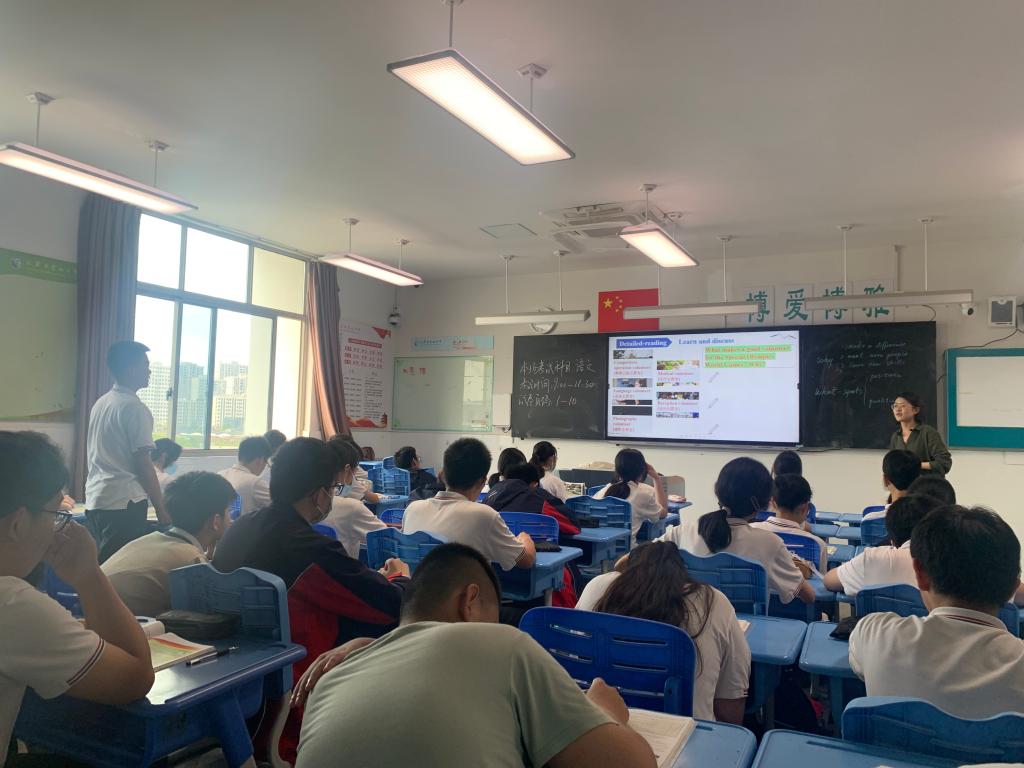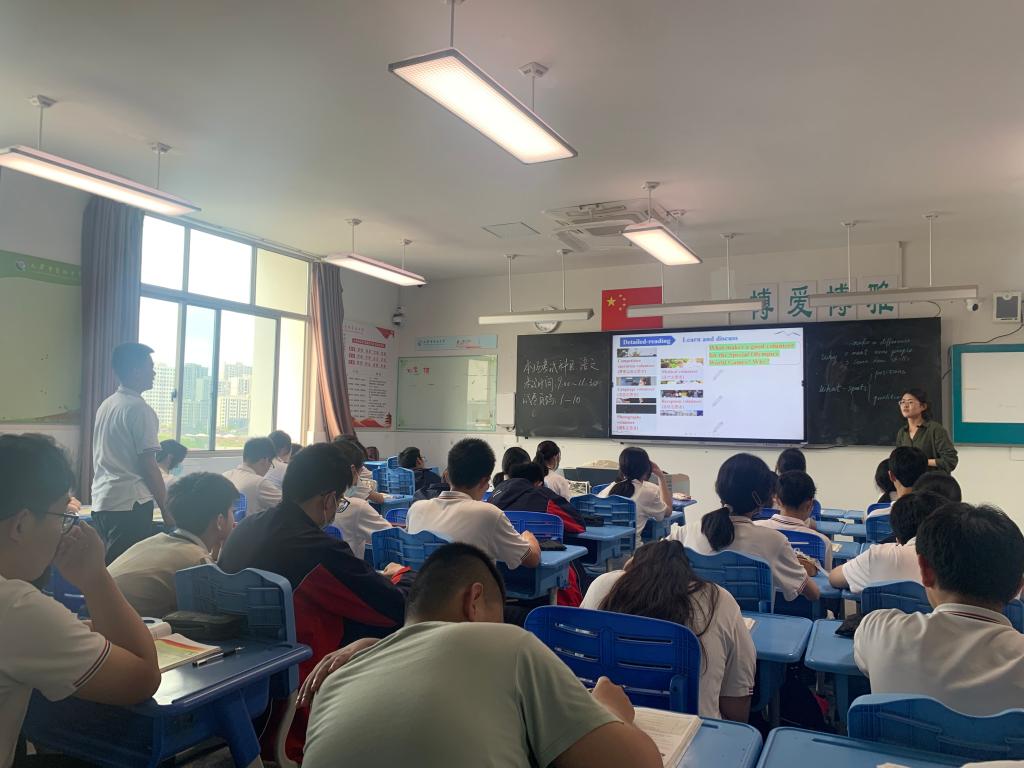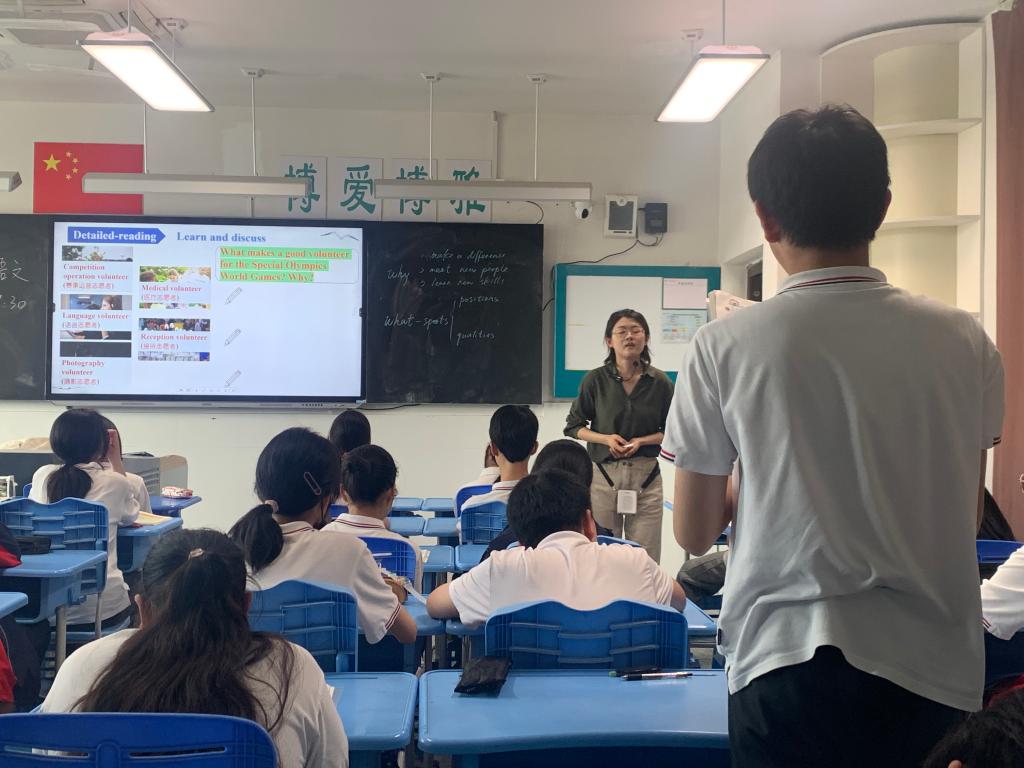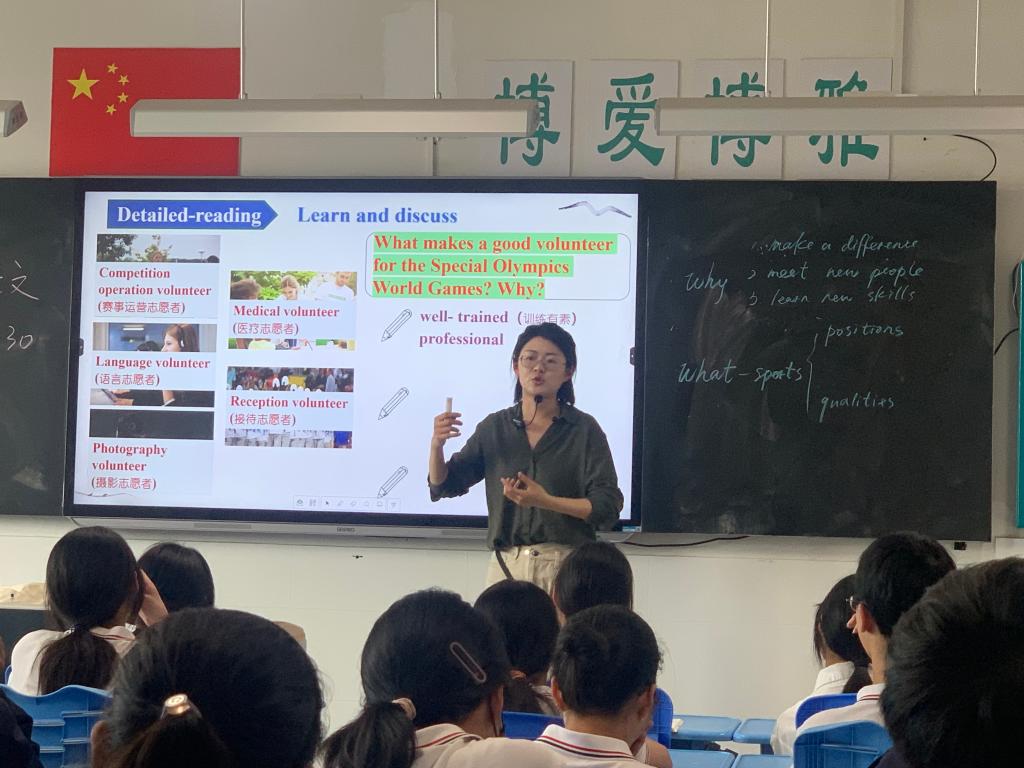8B Unit 6 Reading
Analysis of Teaching material
The reading text for this lesson mainly introduces how the Special Olympics can help people with intellectual disabilities realize their life value and improve their quality of life from the perspective of volunteers. The text consists of 5 paragraphs, which respectively introduce the basic information of the Special Olympics, the contributions of Special Olympics volunteers to the Special Olympics, the author's experience as a volunteer serving the Special Olympics, and their feelings towards it. The key vocabulary mainly involves sports, competitions, etc., and the sentence structure mainly involves the mobilization characteristics of the competition situation and the movement and progress, as well as the description of volunteer services. This article aims to help students understand the "harmony, integration, and participation" of the Special Olympics. The spirit of the Special Olympics aims to cultivate students' values of respecting and caring for others.
2. Analysis of students
This lesson is aimed at eighth grade students. Through the learning in the first lesson, students are aware of the disadvantaged groups around them. They have gained some understanding and accumulate some experience in expressing how to help others. Most students have a high enthusiasm for learning and the ability to obtain detailed information through reading. In addition, students are relatively familiar with the Olympics, but their understanding of the Special Olympics but they lack a deep understanding of what volunteers can do for the Special Olympics. By studying the text, students can comprehend the spirit of sports and gain positive attitudes towards life and values.
3. Teaching Objectives
By the end of the lesson, students should be able to:
master vocabulary and sentence structures related to sports and competitions, such as event, athlete, give up, and win a gold;
obtain and organize basic information about the Special Olympics, volunteers, and athletes in the discourse;
summarize knowledge about the Special Olympics and the experiences of volunteers, and get to know appropriate background extension;
analyze the logical relationship between the main ideas and facts of the text;
realize the importance of joining public welfare activities and help others.
4. Teaching Focus
1. analyze the logical relationship between the main ideas and facts of the text;
2. realize the importance of joining public welfare activities and help others.
5. Teaching Strategies
Communicative Approach; Task-based Approach
6. Teaching Procedures
Step1: Lead-in
1. Watch and answer
Play a clip of video about Why be a volunteer. The students are expected to answer the question:
Why be a volunteer?
Who are volunteers?
What can volunteers do?
Step2: Pre-reading
1. Read the title and make a prediction
Ask the question: When you read the title Volunteering for the Special Olympics World Games, what do you want to know?
Possible questions:
(1) Who volunteered for the Special Olympics World Games?
(2) Why did he/she volunteer for the Special Olympics World Games?
(3) What did he/she do for the Special Olympics World Games?
(4) What are the Special Olympics World Games for?
(5) When and where did the Special Olympics World Games take place?/Which Special Olympics World Games did he/she volunteer for?
(6) How did the volunteer feel after volunteering for the Special Olympics World Games?
2. Learn about the background information
Ask students to think about why it was called special Olympics and introduce the differences among the different Olympics games.
3.Learn about the new words
Ask students to read Liu Ming’s words and put the new words into the right box.
n. types of people
n. things about Olympic Games
v. people may do
adj. people may feel
Step3: While-reading
Skim and match
Go through the article quickly and match the main idea to each paragraph.
An introduction to the Special Olympics World Games——Para 2
Liu Ming’ s experience——Para 4
Liu Ming’ s feelings about the event——Para 1&5
What volunteers do for the event——Para 3
Detailed Reading
Para 1 Liu Ming’s feeling
Read Para.1 and complete the table.
|
The Special Olympics World Games |
Volunteer |
|
Time |
|
Place |
|
Feelings |
At first, he didn’t know ____________. At last, he thought it was the most ________ experience of his life. It’s ________ to work as a volunteer. |
Why has his feeling changed?
Why does the author write about Liu Ming’s feelings at the very beginning?
A. To tell the main idea and show the purpose of the passage
B. To arouse readers interest and attract(吸引) them to know more about his experience
C. To give a conclusion of the passage
Para 2 An introduction to the Special Olympics
Read Para.2 and answer the questions.
What are the Special Olympics World Games for?
What events are included in the Special Olympics World Games?
Para 3 What volunteers do for the event
Listen to Para.3 and fill in the blanks.

Discussion: What makes a good volunteer for the Special Olympics World Games? Why?
What kind of volunteer was Liu Ming?
What did Liu Ming do for the 2007 Special Olympics World Games?
Para 4 Liu Ming’s experience
Imagine you are a reporter and make an interview with Liu Ming.
A: Good afternoon, Liu Ming. I’m …You said it was the most amazing experience to be the volunteer in the Special Olympics. What did you do?
B:_______________________________________.
A: Can you tell us something about Li Hai?
B: He was born with ________________________.
A: What do you think of him?
B:________________________________________.
A: Did he win a gold or a silver?
B: ________________________________________.
A: What’s the most important thing for him?
B: The most important thing is not to ________________ but to _______.
A: What change have the Games brought to him?
B:_________________________________________.
A: Thanks for your time! All volunteers did a great job!
What can we learn from Li Hai?
Para 5 The meaning of the Special Olympics
Read Para.5 and find out the meaning of the Special Olympics.
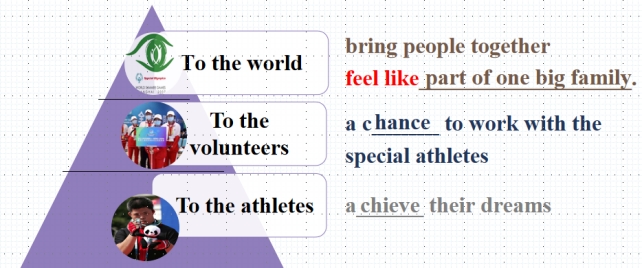
Step4: Post-reading
Group work
The school sports meeting is going to be held next week. Several volunteers are wanted. Please write an  application letter to apply for the job. It’s better to include the reason why you want to be a volunteer and what you can do for the event.
application letter to apply for the job. It’s better to include the reason why you want to be a volunteer and what you can do for the event.
Model: I’d like to apply for the position of … … volunteer. I think (Why) I (What) . I believe I can successfully finish the task.
Further thinking: Does the volunteering only happen in big events?
We need to volunteer our time and let the world filled with love, and that is sunshine for all!
Step5: Homework
1. Refine the application letter.
2. Finish Exercise2.
3. Review and recite the passage.
教学反思:
本节课的主题为8B U6 Sunshine for all-Reading阅读课,Reading板块的主语篇为Volunteering for the Special Olympics World Games,是关于刘明在第十二届上海特奥会做志愿者的报道,介绍了特奥会的基本信息、特奥会志愿者们的工作内容以及志愿者和他所服务的运动员之间发生的故事;本课时基于语篇解读和学情分析,设计了五个逻辑上相互关联、层次上由浅入深的教学目标,符合学生的认知规律。教学活动设计以目标为导向,紧密围绕特奥会、志愿者刘明和选手李海展开。首先,目标1学习与运动、比赛相关的词汇和句式,谈论特奥会和志愿者经历;目标2创设语境,从学生已知出发,引导学生梳理整合文本信息;在此基础上,目标3和目标4学生概括文本的信息结构,形成对特奥会知识的认知,对智障人士的理解,以及对志愿者的赞许;目标5在不同的阅读活动中,把语言知识学习、语言技能运用、思维品质发展和文化意识形成都有机地融入到课程内容和教学活动中,为学生主动参与、积极思考、互助合作提供了保障。
优点:1、以单元整体教学理念为指导,本单元六个板块共包含15个语篇,篇幅长短和文体类型各不相同,但都围绕“Sunshine for all”这一主题而展开,内容涉及世界特殊奥运会等体育赛事,同时介绍了志愿者公益服务、爱心援助等活动。这堂课挖掘了文本育人价值,加学生深对社会特殊群体和弱势群体的了解,促进对公益事业和志愿服务的探究与思考;构建彼此尊重、互相帮助、热心公益的良好品质和人际关系;树立尊重他人、关爱他人的价值观,坚定对社会负有责任感的人生态度和信念。
2. 善于联系激活旧知,联系新知,阅读准备充分。学生在第一课时了解了需要关注的特殊群体,对单元主题有了初步概念,通过志愿者这一话题导入这节课的文本,学生对奥运会比较熟悉,但是对特奥会并不熟知,因此前置背景信息的铺垫极为重要。文本本身关于志愿者工作的内容描写比较模糊,因此在精读环节,教师加入了对志愿者岗位内容的补充和志愿者要求的探讨,为最终读后活动的产出做铺垫。
缺点:
要充分考虑学生学情,本课时文本生词较多,学生即使通过课前预习,对生词的掌握还是不牢固,很多单词都不会读或者羞于读,因此不敢主动开口发表自己的看法,课堂气氛不活跃。未能设置分层任务,师生互动主要体现在学情较好的学生中,阅读能力较差的学生不能良好的融入课堂。
